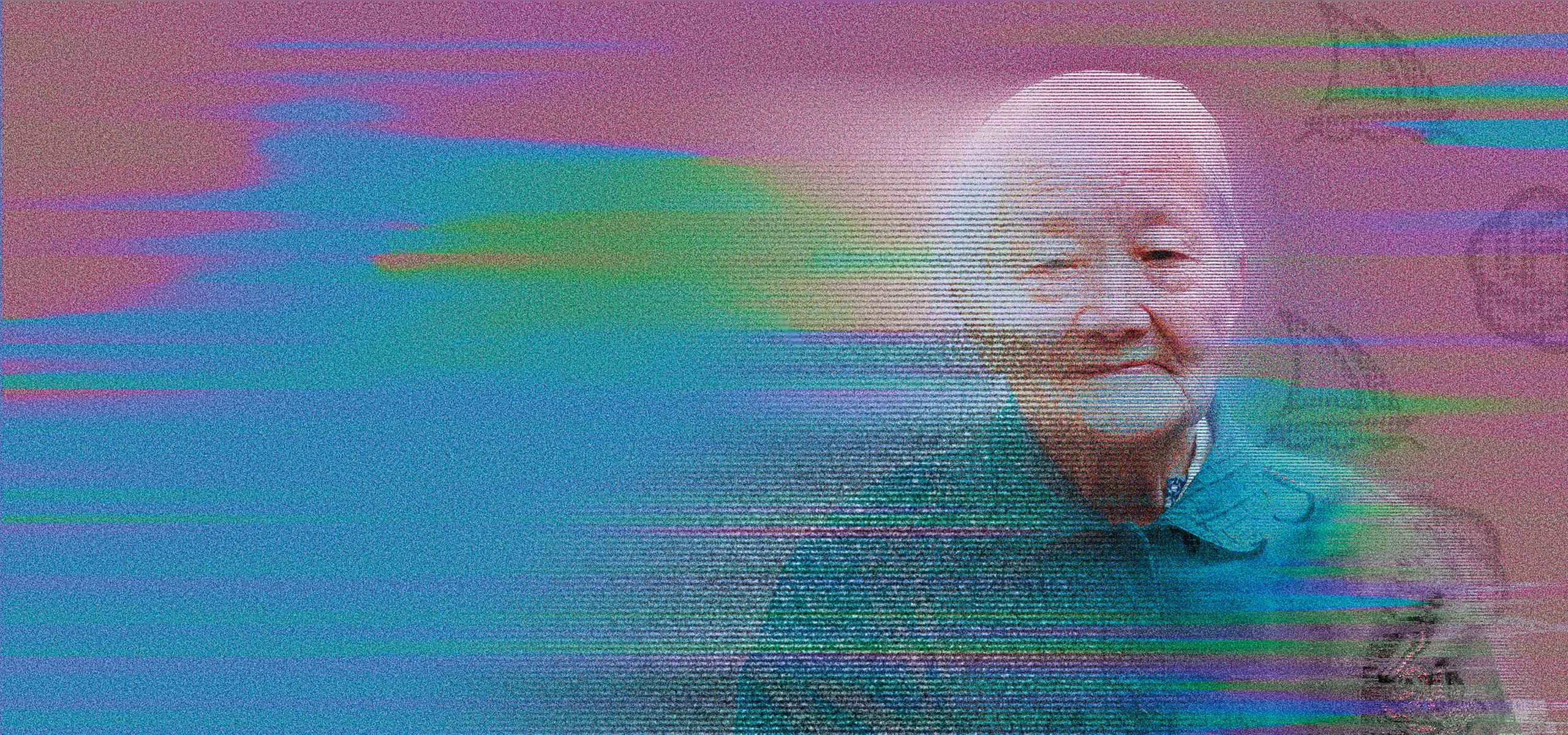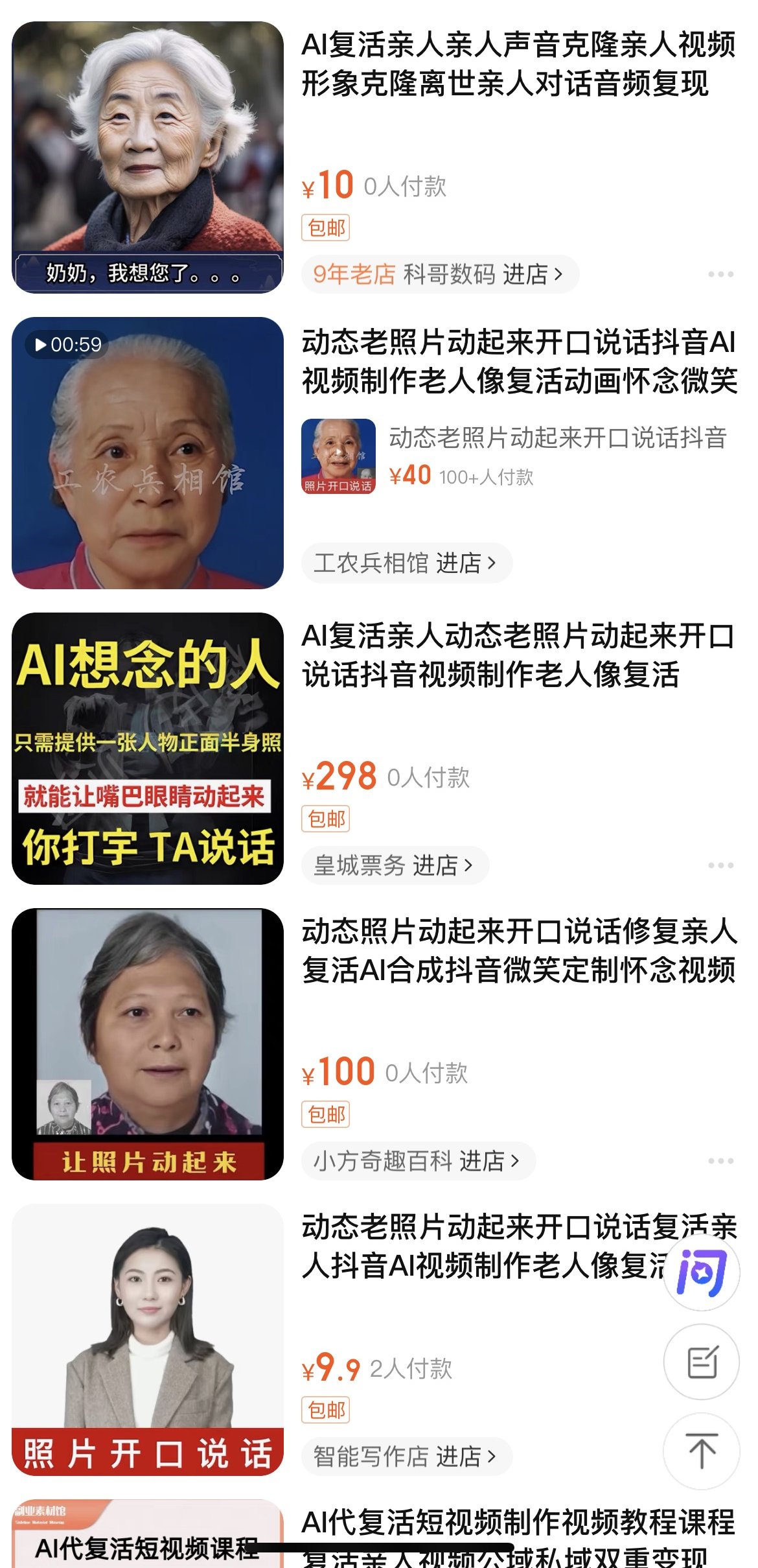As China’s “AI revival” services boom, ethical and legal controversies spread
When musician Tino Bao’s daughter, Bao Rong, died three years ago, he thought he would never see her again. But on January 19, they celebrated his wife’s birthday together as a family. Tino Bao had spent years working on a digital AI version of his daughter to bring her back from the dead.
On the talk show Da Win Dining last September, Tino Bao, with white hair draping on his shoulder, expressed how he had missed his daughter. “I’ve kept my hair this long because when my daughter was alive, it would touch her whenever I bumped her forehead to say good morning and good night every day.” Tino Bao described how he and his wife, paralyzed by sorrow, didn’t speak to each other for over half a year after Bao Rong’s death. He sought out a friend who specialized in AI, studied for a Ph.D. in AI technology, and set about recreating Bao Rong in digital form using generative AI technology similar to those found in ChatGPT and Midjourney.
Though the AI version of Bao Rong can chat with her parents similar to how she did in real life, her digital resurrection is controversial. The business of reviving loved ones with AI is growing fast in China and is expected to be a trillion-yuan industry in the near future according to media outlet The Paper. But for many looking for services that can bring their loved ones back to life, the experience doesn’t bring solace but pain and disappointment.
Recent incidents where fans of deceased celebrities resurrected them via AI have sparked huge debate online. A hashtag related to an AI version of Qiao Renliang (an actor who committed suicide in 2016) has gained over 240 million views on Weibo since March 17. In the short video, a digital Qiao addresses his family and fans in his familiar voice and says he wants to wish them farewell. “Please respect the deceased. Such behavior without the permission of the family is ridiculous. Stop exploiting the deceased! Let the dead rest in peace!” one Weibo post with nearly 1,500 “likes” reads.
Qiao’s father told reporters the unapproved AI versions of his son caused him trauma. “They didn’t ask for our permission. This is scarring,” he told the National Business Daily on March 16. The video of Qiao has since been deleted. The family of Godfrey Gao, a celebrity who died in 2019, has threatened to sue video makers who brought their son back to life. These incidents have raised questions about personal image rights for deceased persons. “Using someone’s portrait without their permission violates their rights. Similarly, employing AI-generated images in videos or communication to trick the close relatives of the person depicted into parting with money or assets constitutes fraudulent behavior,” Wang Xiangpin, a lawyer with the Beijing Tianping Law Firm, told Red Star News this month.
When 39-year-old Yu Xiang heard about this technology last year, he paid 50 yuan to an account on the social media platform Xiaohongshu to make a video of his deceased grandfather. “We were very close,” Yu says. Yu’s grandfather died in 2010 before smartphones with cameras became ubiquitous, so there were few photos and videos to remember him by. He hoped the new AI technology could create videos to fill this gap. “My whole family was all gathered together during the Spring Festival, so I thought it would be a good chance for us to commemorate Grandpa,” Yu tells TWOC.
However, Yu quickly canceled his plan after seeing the results. Unlike the painstakingly recreated Bao Rong, who could respond to questions in real time, Yu’s resurrected AI grandfather appeared in a one-minute video where he repeated a script Yu had written and sent to the company. Only his mouth and jaw moved. “The movement of the mouth wasn’t so real, and the voice didn’t sound very close to my grandpa’s,” Yu says. “The outcome didn’t meet my expectations.”
The technology, at least the versions readily available to regular consumers, remains immature. Creating a digital avatar of a deceased person requires lots of digital footage of that individual. Few people “keep enough digital assets of their passed loved ones,” says Wu Songliang, the founder of an AI company that focuses on technologies offering “emotional companionship.”
Voices are also tricky, “especially for those who speak with accents rather than standard Mandarin,” Wu says. Unlike celebrities like Tino Bao who have the money to set up a team to study his daughter’s voice, normal people like Yu face difficulties extracting enough voiceprints of their loved ones. The result is a poor imitation of the real voice.
Despite these drawbacks, the industry continues to boom. On the e-commerce platform Taobao, thousands of shops sell “AI revival” services for prices from 10 to 10,000 yuan. One product that claims to “make posthumous photographs blink and talk” has already sold over 600 units. Wu established his company in May last year and launched its first product, an AI avatar based on a real person that can move its mouth and answer real-time questions, in December, selling nearly 1,000 units since then. Subscribers pay 52.1 yuan a month or 521 yuan a year to chat with the customized AI avatar via voice or text.
The potential of AI companions isn’t just limited by technology; other obstacles are psychological. “One customer didn’t upload anything until their subscription expired. He told me that he was not yet ready to meet his passed loved one,” Wu says. “People miss their loved ones, but some fear that they will experience the trauma of loss again.”
“Some pain can only be cured with time, and the best medicine is to not mention it again,” says Yu Xiang. It took Yu and his family almost three years to process their grief for his grandfather. “If we keep touching the scar with an ‘AI relative,’ that can be harmful. In the future, I hope the AI could help us recover from the sorrow, not immerse ourselves in it.”
Yet others are strong supporters of this technology. “My AI grandma gave me hope. She seems so alive that I feel she is really here,” says 20-year-old Zhang Kunyuan. Her grandmother passed away in 2022 when Zhang was in high school. She spent 30 yuan on an AI revival service in January this year.
Pandemic controls and concerns about Zhang’s studies meant Zhang never got to say goodbye in person or attend her grandmother’s funeral. “My parents chose to keep the news of my grandmother’s death from me. They were worried about stressing me out since I was quarantined at school while preparing for the college entrance exam,” Zhang says. Zhang remembers that one day when she returned after school she found that the red Spring Festival couplets hung outside the door had been taken down (traditionally, people avoid displaying celebratory colors after someone has died). After her repeated questioning, Zhang’s parents eventually revealed the truth. Not seeing her grandmother before she died is “one of my life’s regrets. So when I heard about the AI revival service, it felt like a new chance for me,” she says.
Zhang arranged the AI video for what would have been her grandmother’s birthday. Her grandmother appears to talk in the video, reading a script Zhang prepared. Compared to traditional memorial activities like tomb-sweeping and burning paper money during the Qingming Festival, Zhang feels making an AI video of her beloved grandma is a more effective way to convey their feelings of longing. She didn’t share the video with her other relatives, since she worried they might not approve of the technology.
Many younger generations like Zhang are experimenting with AI technology to bring dead relatives back to life, and seeing their attitudes toward life and death change in the process. “Some people believe that we should let the dead rest in peace without disturbing them. This is a cultural belief,” Wu says. “However, our generation who have grown up with the internet will be more open-minded toward these digital technologies.” For Wu and his company at least, that will be a good thing.
What Booming AI Revival Services Mean for China’s Relationship to Death is a story from our issue, “Viral Attractions.” To read the entire issue, become a subscriber and receive the full magazine.














